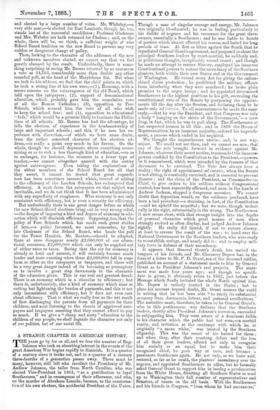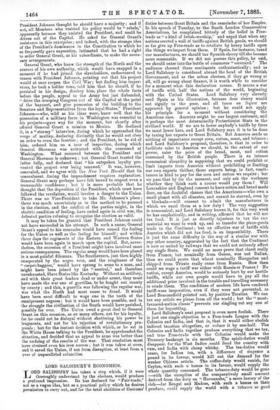A STRANGE CHAPTER IN AMERICAN HISTORY.
THE years go by for us all, and we fear the number of Eng- lishmen who took an absorbing interest in the events of the great American War begins rapidly to diminish. It is a quarter of a century since it broke out, and in a quarter of a century three-fourths of a generation passes away. There must be many, however, still left who recollect the Presidency of Mr. Andrew Johnson, the tailor from North Carolina, who was elected Vice-President in 1864, " as a gratification to loyal Southerners," and in recompense of their adherence, and who, on the murder of Abraham Lincoln, became, to the consterna- tion of his own electors, the accidental President of the Union. Though a man of singular courage and energy, Mr. Johnson was originally ill-educated ; he was in feeling, particularly in his dislike of negroes and his reverence for the great slave- owners, essentially a Southerner; and he was liable to bursts of passion which almost affected his reason, and lasted for long periods of time. At first so bitter against the South that he repudiated General Grant's agreement, and proposed to shoot the principal Southern leaders by court-martial, he suddenly and, as politicians thought, inexplicably veered round ; and though he made no attempt to restore Slavery, employed his immense Constitutional powers to restore the ascendancy of the Southern planters, both within their own States and in the Government of Washington. He vetoed every Act for giving the enfran- chised slaves protection ; he prohibited the military officers from interfering when they were murdered ; he broke plain promises to the negro troops ; and he appointed determined Southerners to the highest positions in his gift, overruling the constitutional veto of the Senate by postponing the appoint- ments till the day after the Session, and declaring them to be made only ad interim. To all remonstrances he made the same reply,—that he was the President, and that Congress was only a body " hanging on the skirts of the Government,"—a mere drag, in fact, which he was to pull along. The Northerners at last suspected treason in all this ; and in 1868 the House of Representatives, by an immense majority, ordered his impeach- ment, a process which ended in his acquittal.
We thought the impeachment unwise, and, in one way, unjust. We could not see then, and we cannot see now, that any of the acts brought forward in evidence against Mr. Johnson, whatever their secret motive, transcended the immense powers confided by the Constitution to the President,—powers, be it remembered, which were intended by the framers of that document to be exercised. The Veto has always been a reality ; the right of appointment ad interim, when the Senate is not sitting, is constantly exercised, and is essential to prevent disaster ; and the claim of the President, as Commander-in- Chief, to give orders to his soldiers without Congressional control, has been repeatedly affirmed, and once, in the hands of Andrew Jackson, stopped a dangerous secession. We cannot doubt that deposition would, on the evidence produced, have been a bad precedent—a straining, in fact, of the Constitution —and we upheld the acquittal ; but we were, though techni- cally in the right, substantially in the wrong. The Northerners, it now seems clear, with that strange insight into the depths of personal character which great masses of men when strongly excited so often display, had judged Andrew Johnson rightly. He really did intend, if not to restore slavery, at least to reverse the result of the war ; to hand over the National Government to the Southern leaders, who were ready to re-establish serfage, and nearly did it ; and to employ mili- tary force in defence of their ascendancy. It appears that General Grant's death has untied the tongues of his friends, and Mr. Chauncey Depew has, in the form of a letter to Mr. F. D. Grant, son of the deceased soldier, published an account of a statement made to him by General Grant as to President Johnson's real projects. The state- ment was made four years ago ; and though no specific date is given, it obviously refers to 1867, just before the Message which finally irritated the whole North against him. Mr. Depew is entirely trusted in the States ; but to place his account beyond doubt, Mr. Grant assures the world in writing that he has been able " to verify its substantial accuracy from documents, letters, and personal recollections." The narrative must, therefore, be taken to be General Grant's, who in this posthumous way declares that the Southern leaders, shortly after President Johnson's accession, succeeded in subjugating him. They were aware of a dominant foible in his character which the public had not seen,—a morbid vanity, and irritation at the contempt with which he, as originally "a mean white," was treated by the Southern oligarchy. This was the secret of his hatred for them ; and when they, after their crushing defeat and the loss of all their great leaders, offered not only to recognise him socially as an equal, but to make him their recognised chief, he gave way at once, and became a passionate Southerner again. He not only, as we have said, restored, so far as he could, the planters' ascendancy over the negroes, and appointed Southerners to office, but he formally asked General Grant to support him in issuing a proclamation from the White House, directing all Soutterii States to send up to Washington their full number of representatives and Senators, of course on the old basis. With the Southerners and his friends in Congress, "from whom he had aasurances," President Johnson thought he should have a majority ; and if not, all Members who resisted his policy would be " rebels," apparently because they resisted the President, and could be driven out of the Capitol. He asked for General Grant's assistance in this enterprise ; and indeed, with the strange idea of the President's dominance in the Constitution to which he so frequently gave expression, intimated that he had a right to order General Grant, as his subordinate, to make the neces- sary arrangements.
General Grant, who knew the strength of the North and the sources of his own authority, which would have snapped in a moment if he had joined the alaveholders, endeavoured to reason with President Johnson, pointing out that his project would at once reopen the Civil War; but finding him imper- vious, he took a bolder tone, told him that he should, if he persisted in his design, disobey him, place the whole facts before the people, appeal to the Army but just disbanded, " drive the usurping Congress out of the Capitol at the point of the bayonet, and give possession of the building to the Senators and Representatives from the loyal States." President Johnson—who, wild as his ideas were, knew well that the possession of a military force in Washington was essential to his projects—gave way for the moment, but shortly after offered General Grant a mission to Mexico. He declined it, in a " stormy " interview, during which he approached the verge of mutiny, declaring distinctly that he would not obey an order to cross the frontier ; and the President, to be rid of him, ordered him on a tour of inspection, during which General Sherman was entrusted with the command at Washington. What occurred between the President and General Sherman is unknown ; but General Grant trusted the latter fully, and declared that "his outspoken loyalty pre- vented the project ever being renewed." It was, however, concealed, and we agree with the New York herald that its concealment daring the impeachment requires explanation. General Grant may perhaps have felt bound to respect even a treasonable confidence ; but it is more probable that he thought that the deposition of the President, which must have followed the revelation, would involve a danger to the Union. There was no Vice-President to take Mr. Johnson's place ; there was much uncertainty as to the method to be pursued in the election, and the conflict of the parties might, in the electric condition of feeling, have ended again in civil war, the defeated parties refusing to recognise the election as valid.
It may be taken for granted that President Johnson could not have succeeded in his attempt. In such a cause, General Grant's appeal to his comrades would have roused the feeling for the Union as well as the feeling for himself ; and within three days the regiments of the Eastern and Western States would have been again in march upon the capital. Bat, never- theless, the secession of a President might have involved most serious consequences. The regular army would have been placed in a most painful dilemma. The Southerners, just then highly exasperated by the negro vote, and the roughness of the " carpet-baggers," would have sprung to arms to a man, and might have been joined by the " neutral," and therefore unexhausted, Slave States like Kentucky. Without an artillery, and with their great leaders dead or under arrest, they must have made the war one of guerillas, to-be fought out county by county ; and this, a guerilla war following the regular war, was what the North had most cause to dread. It would have been most difficult to wage one in the teeth of the omnipresent negroes ; but it would have been possible, and in the struggle the civilisation of the South would have perished, possibly for ever. The Union owed a great deal to General Grant on this occasion, as on many others, not for his loyalty, for he could not be disloyal without shattering his power to fragments, and not for his rejection of revolutionary pro- posals ; but for the instant decision with which, as he sat in the White House talking to the President, he apprehended the situation, and decided that an appeal to arms was better than the undoing of the results of the war. That resolution must have strained even his iron nerves ; but it was taken at once, and it saved the Union, if not from disruption, at least from a year of unparalleled calamities.















































 Previous page
Previous page